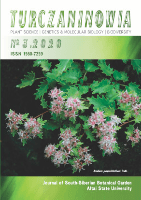
Turczaninowia
Scope & Guideline
Championing Open Access Research for Global Impact
Introduction
Aims and Scopes
- Floristic Studies:
The journal extensively publishes findings related to new and rare plant species, expanding the knowledge of regional floras, particularly in Siberia, Mongolia, and the Caucasus. - Taxonomic Research:
It includes detailed taxonomic revisions, descriptions of new species, and updates on the nomenclature and classification of various plant families and genera. - Cytogenetic and Molecular Analysis:
Research involving chromosome number studies, DNA barcoding, and genetic polymorphisms is a significant focus, providing insights into the evolutionary relationships and diversity of plant species. - Impact of Invasive Species:
The journal addresses the presence and impact of alien species in various regions, contributing to understanding biodiversity changes and conservation needs. - Ecological and Morphological Studies:
Publications often explore the ecological traits and morphological characteristics of plants, enhancing knowledge of their adaptations and interactions within ecosystems.
Trending and Emerging
- Molecular Phylogenetics and DNA Barcoding:
There is an increasing focus on molecular techniques, such as DNA barcoding, to understand plant diversity and relationships, which enhances the accuracy of taxonomic classifications. - Conservation and Ecology of Rare Species:
Research is increasingly directed towards the conservation of rare and endemic species, highlighting their ecological roles and the need for protective measures. - Invasive Species Research:
The exploration of invasive species and their ecological impacts has gained prominence, reflecting a growing concern over biodiversity loss and ecosystem integrity. - Climate Change Impacts:
Emerging studies are beginning to address the impacts of climate change on plant distributions and community structures, indicating a trend towards understanding the ecological consequences of global environmental shifts. - Micropropagation and Conservation Techniques:
The application of in vitro techniques for the conservation of rare and endangered species is becoming more prominent, reflecting a practical approach to biodiversity preservation.
Declining or Waning
- Historical Taxonomic Reviews:
There is a noticeable decline in historical taxonomic reviews of older species, possibly due to a shift towards more contemporary studies focused on new discoveries and genetic analyses. - General Flora Surveys:
Broader surveys of flora without specific taxonomic or ecological focus seem to be less frequent, suggesting a trend towards more targeted research on specific taxa or regions. - Traditional Herbarium Studies:
While herbarium studies remain important, the emphasis on utilizing modern molecular techniques appears to be overshadowing traditional herbarium-based taxonomic work.
Similar Journals
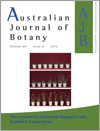
AUSTRALIAN JOURNAL OF BOTANY
Championing the voice of plant scientists since 1953.The Australian Journal of Botany is a prestigious peer-reviewed journal published by CSIRO PUBLISHING, dedicated to advancing the field of plant sciences and ecology. Established in 1953, this journal provides a critical platform for researchers to share original research findings, reviews, and perspectives in subjects ranging from plant biology to ecological interactions, with a focus on Australian flora and its conservation. With an impressive impact factor and categorized in the Q3 quartile in both Ecology, Evolution, Behavior and Systematics and Plant Science, the journal ranks competitively within its fields, allowing authors to reach a diverse audience of professionals, students, and fellow researchers. The journal is accessible in print and electronically through its ISSN: 0067-1924 and E-ISSN: 1444-9862, providing wider access to vital research outcomes that influence environmental policies and natural resource management. As it aspires towards innovation and excellence, the Australian Journal of Botany remains an essential resource for those passionate about the richness of plant biodiversity and ecological understanding.
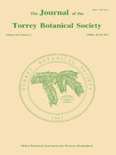
JOURNAL OF THE TORREY BOTANICAL SOCIETY
Fostering innovation in ecology and plant science.JOURNAL OF THE TORREY BOTANICAL SOCIETY is a prominent academic journal dedicated to advancing the fields of botany and ecology, published by the esteemed TORREY BOTANICAL SOCIETY. With an ISSN of 1095-5674 and an E-ISSN of 1940-0616, this journal serves as a critical platform for researchers, professionals, and students to share their findings and insights. Despite its status in the Q4 category for the 2023 rankings across Ecology, Plant Science, and Ecology, Evolution, Behavior and Systematics, the journal continues to foster significant discourse and collaboration in the botanical sciences, aiming to elevate the understanding of plant biology and ecosystems. Its open access options enhance accessibility, ensuring that groundbreaking research reaches a wider audience. Published in the United States, the journal features work from both established scientists and emerging scholars, making it a vital resource for anyone involved in the study of plants and their environmental interactions. Explore the JOURNAL OF THE TORREY BOTANICAL SOCIETY to engage with cutting-edge research and contribute to the ongoing dialogue in the botanical sciences.
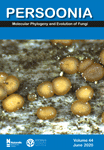
PERSOONIA
Innovating Research in Systematics and BotanyPERSOONIA, a distinguished journal published by RIJKSHERBARIUM, serves as a pivotal platform for the dissemination of high-quality research in the fields of Ecology, Evolution, Behavior, and Systematics, as well as Plant Science. Established with a commitment to advancing scientific knowledge, PERSOONIA has achieved an impressive Q1 ranking in these areas, highlighting its significant impact within the academic community, as evidenced by its ranking of #12 out of 721 journals in its field, placing it in the top 2% of publications. With a publication history that spans from 1996 to present, the journal regularly features innovative studies that push the boundaries of understanding in ecological and botanical sciences. While Open Access options are currently limited, researchers and professionals alike benefit from subscription access to this vital resource. Located in the Netherlands, PERSOONIA continues to be a beacon for scholars aiming to enrich the discourse in evolving ecological and plant science disciplines.
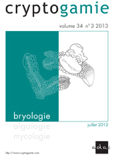
CRYPTOGAMIE BRYOLOGIE
Illuminating the Life of BryophytesCRYPTOGAMIE BRYOLOGIE is a prominent academic journal published by ADAC-CRYPTOGAMIE, focusing on the intricate field of bryology—the study of mosses and other bryophytes. Established in 1999 and continuing its commitment to scholarly excellence through to 2024, this journal serves as a vital platform for researchers, professionals, and students invested in ecosystem dynamics, plant sciences, and evolutionary biology. Recognized for its rigorous peer-review process and notable contributions, CRYPTOGAMIE BRYOLOGIE holds esteemed rankings, with a Q3 categorization in Ecology, Evolution, Behavior and Systematics and Q2 in Plant Science as of 2023. While the journal operates without open access, its articles are essential for advancing knowledge and fostering discussion in the disciplines it serves. Given its strategic position within the Scopus Ranks, where it occupies significant rankings in the domains of Plant Science and Ecology, the journal is poised to influence ongoing research and inspire future studies in the rapidly evolving world of bryophytes.

Bangladesh Journal of Plant Taxonomy
Connecting researchers to the heart of plant science.Welcome to the Bangladesh Journal of Plant Taxonomy, a leading open-access publication dedicated to advancing the understanding of plant taxonomy in the context of Bangladesh's rich biodiversity. Published by the Bangladesh Association of Plant Taxonomists, this journal plays a crucial role in fostering academic discourse and dissemination of research findings since its establishment. With its ISSN 1028-2092 and E-ISSN 2224-7297, the journal provides a platform for researchers, professionals, and students to share their contributions to plant science. Although it has discontinued its coverage in Scopus from 2018, it remains a valuable resource, evidenced by its rankings in the agricultural and biological sciences categories, including a placement of #330/403 in Plant Science and #515/588 in Ecology, Evolution, Behavior, and Systematics. Open access since 2005, the journal ensures that critical research is freely available to all, supporting the global community in the study and preservation of plant biodiversity.

KOREAN JOURNAL OF PLANT TAXONOMY
Cultivating collaboration in plant taxonomy research.Korean Journal of Plant Taxonomy, published by the Korean Society of Plant Taxonomists, serves as a pivotal platform for researchers and professionals in the fields of plant taxonomy and ecology. With an ISSN of 1225-8318 and a burgeoning E-ISSN of 2466-1546, this journal aims to disseminate high-quality research that contributes to our understanding of plant species diversity, classification, and evolution. Spanning the years from 2018 to 2024, the journal finds its niche within Q3 rankings in both Ecology, Evolution, Behavior and Systematics and Plant Science, reflecting its impactful contributions and relevance in the academic community. The journal's scope encompasses various studies aimed at advancing plant taxonomy in South Korea and globally. By fostering collaboration and sharing groundbreaking research, the Korean Journal of Plant Taxonomy plays a crucial role in shaping the discourse in plant sciences, making it an invaluable resource for students, researchers, and professionals alike, committed to advancing knowledge in this dynamic field.
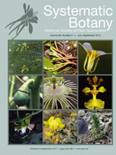
SYSTEMATIC BOTANY
Shaping the Future of Botanical ScienceSystematic Botany, published by the American Society of Plant Taxonomists, is an esteemed journal focusing on the diverse fields of plant taxonomy, systematics, and evolution. With an ISSN of 0363-6445 and an E-ISSN of 1548-2324, this journal serves as a critical platform for researchers aiming to advance our understanding of plant biodiversity and evolutionary relationships. Operating since 1994, Systematic Botany has garnered significant recognition, achieving a Q2 ranking in Ecology, Evolution, Behavior and Systematics, and Plant Science categories, and ranking within the top half of Scopus for Genetics. The journal prioritizes publishing high-quality, peer-reviewed research, making it an essential resource for academics, practitioners, and students alike. Although it does not provide open access options, the journal's robust reputation in both American and international botanical research speaks to its pivotal role in disseminating vital scientific knowledge in the field. For those interested in the latest advancements in plant science, Systematic Botany is indispensable.
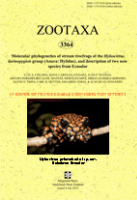
Zootaxa
Fostering collaboration in the realm of ecological discovery.Zootaxa is a prestigious peer-reviewed journal dedicated to the rapid publication of new taxa and biodiversity research in the fields of Animal Science and Zoology as well as Ecology, Evolution, Behavior, and Systematics. Published by Magnolia Press in New Zealand since 2005, this journal holds a significant position within the academic community, holding a Q2 ranking in key categories as of 2023. With an ISSN of 1175-5326 and E-ISSN of 1175-5334, Zootaxa is indexed in Scopus, reflecting its impact and relevance in contemporary research. While it operates under a subscription model, the journal remains committed to advancing the understanding of biodiversity and the systematic classification of organisms. Researchers, professionals, and students can rely on Zootaxa for high-quality research that contributes to the ongoing dialogue in taxonomy and ecological studies, as it aims to foster collaboration and knowledge sharing among scientists globally.
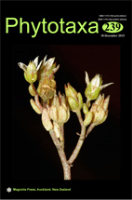
Phytotaxa, published by MAGNOLIA PRESS, is an esteemed journal in the fields of Plant Science and Ecology, Evolution, Behavior and Systematics. Established to cater to the growing need for high-quality research dissemination in botany, this journal presents the latest findings in plant taxonomy, systematics, and biodiversity. With its H-Index reflecting significant academic influence, and recognized as Q2 in Plant Science and Q3 in Ecology by Scopus, it stands as a reputable source for scholars and practitioners alike. The journal operates without open access restrictions, allowing for a wider reach to its audience. Positioned in New Zealand, Phytotaxa has been pivotal since its inception, contributing to the global understanding of plant diversity and ecology from 2010 to 2024. Its rigorous peer-review process ensures the high quality of published articles, making it an essential resource for researchers, professionals, and students dedicated to advancing the field of botany.
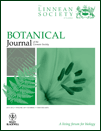
BOTANICAL JOURNAL OF THE LINNEAN SOCIETY
Connecting Scholars to the Heart of Plant ScienceThe Botanical Journal of the Linnean Society, published by Oxford University Press, stands as a premier platform for interdisciplinary research within the realms of Ecology, Evolution, Behavior, and Plant Science. With a notable impact factor reflective of its esteemed reputation, this journal is classified in the Q1 quartile for both Ecology and Plant Science, placing it among the most influential publications in these fields. Since its inception in 1969, and with an anticipated convergence of research extending to 2024, it has become essential for scholars and professionals seeking to engage with cutting-edge studies, theoretical frameworks, and practical applications that drive our understanding of plant biology and ecological systems. The journal’s commitment to excellence is underscored by its robust Scopus rankings—achieving an impressive 83rd percentile in Ecology and a 82nd percentile in Plant Science. This makes the Botanical Journal of the Linnean Society a crucial resource for researchers, educators, and students alike, eager to advance their knowledge and contribute to the evolving discourse in botany and environmental studies.